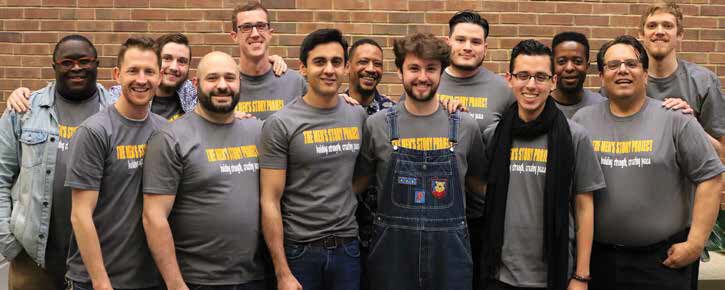The Garage Project That Changed Everything
Meet Mike, a 42-year-old electrician who’d been trying to get in shape for five years. Every January, same story—gym membership, meal prep containers, big plans. By March? Back to pizza and Netflix. Then his buddy Dave mentioned wanting to lose weight too. They made a simple deal: meet at Mike’s garage gym every Tuesday and Thursday, 6 AM sharp. The accountability changed everything. Research shows that having a specific accountability partner increases your chance of success to 95%. Mike’s not just stronger now—he’s got a friendship that runs deeper than surface talk about sports and work.
The Science Behind Brotherhood and Goals
Here’s something most guys don’t realize: we’re actually wired for accountability. But we’ve bought into this myth that real men go it alone.
What the Research Actually Says
The American Society of Training and Development found some jaw-dropping numbers. If you simply have an idea or goal, you only have a 10% chance of success. But publicly committing your goals to someone gives you at least a 65% chance of completing them. Having a specific accountability partner? Your odds jump to 95%.
That’s not feel-good psychology. That’s hard data.
“Social connections can act as a buffer against the impact of stressful or negative life experiences on mental health,” notes research published in the Journal of Men’s Health. Social support increases the likelihood of those with mental health problems seeking professional help.
Dr. Marcus Rodriguez, a sports psychologist who works with elite athletes, puts it this way: “Men respond to accountability because it leverages our competitive nature while building genuine connection. It’s not about weakness—it’s about strategic partnership.”
Why Men Struggle with Connection
Here’s the brutal truth: men are significantly less likely to utilize health care services compared with women. When it comes to mental health, men hold more reluctant attitudes toward engaging with mental health services.
The reasons? Traditional masculinity tells us we should be:
- Self-reliant
- Emotionally controlled
- Competitive rather than collaborative
- Problem-solvers who work alone
But this approach backfires. Research shows the most significant benefit of community-based approaches for men has been reducing sociocultural stigmatization. Being able to interact with other men in activity-oriented community groups helped men change their self-perception on mental health management.
The Accountability Effect in Action
A groundbreaking ethnographic study of peer support found something remarkable: participants experienced themselves as accountable for and to their peers in what amounts to a shared project of recovery. If someone was missing, it was often another member who checked on the individual, making it nearly impossible for someone to drop out or relapse unnoticed.
This mutual accountability created something powerful—what researchers called “authentic relationships” that acted as capacity building toward broader life goals.
The Male Brain and Partnership
Men’s brains are wired for goal achievement and competition. But here’s what’s interesting: when performance is measured and reported, the rate of improvement accelerates.
Research on men’s social connections revealed that participants expressed difficulty developing trust and meaningful therapeutic relationships when providers could not maintain professionalism and competency. Men appreciate honesty and genuine effort from their support partners.
Translation? Men don’t need cheerleaders. We need reliable partners who show up and keep it real.
Breaking Down the Barriers
Studies show men face specific challenges with accountability:
- Fear of being perceived as weak
- Preference for activity-based rather than talk-based support
- Need for clear roles and expectations
- Desire for reciprocal rather than one-way relationships
But when these needs are met, the results are transformative. Men in community-based accountability groups found role models within the community, which motivated them to continue taking care of themselves.
Your Accountability Arsenal: 5 Game-Changing Strategies

1. The Two-Way Partnership Rule
Forget one-sided support. Research shows successful accountability partnerships require reciprocity that helps strengthen socialization skills.
Your move: Find someone with their own goal. You track theirs, they track yours. Equal investment, equal results.
Example: You want to run three times a week, your buddy wants to meal prep on Sundays. Check in via text every Wednesday and Sunday.
2. The Activity-Based Connection Method
Men prefer activity-oriented community groups over traditional talk therapy approaches. Build your accountability around doing, not just talking.
Your move: Choose goals that involve action you can do together or separately but report back on.
Ideas:
- Gym partnerships
- Weekly hiking check-ins
- Home improvement projects
- Learning new skills (guitar, coding, cooking)
3. The Clear Structure System
Men thrive with clear expectations and measurable outcomes. The most helpful accountability partners are ones who show up consistently and have compatible schedules.
Your move: Set specific times, methods, and consequences.
Framework:
- Weekly check-in time (same day, same time)
- Specific metrics to track
- Agreed-upon consequences for missing targets
- Clear communication method (text, call, in-person)
Remember: start with foundation goals first. Sleep, movement, and nutrition make everything else easier to achieve with your partner.
4. The Brotherhood Building Approach
Social support that moves in both directions has positive synergistic effects beyond just goal achievement.
Your move: Use your accountability partnership to build real friendship.
How:
- Share wins and struggles honestly
- Ask about life beyond the goal
- Celebrate each other’s progress
- Be the guy who checks in when they’re MIA
5. The Expansion Strategy
Start with one goal, then gradually expand. Having an accountability partner can help you plan out multiple goals and identify obstacles together.
Your move: Once you nail your first goal together, level up.
Progression:
- Month 1-2: Single goal focus
- Month 3-4: Add one related goal
- Month 5-6: Include broader life goals
- Month 7+: Become each other’s go-to support system
Try This Today
Right now, before you close this article:
- Text one guy you respect who might want to improve something in his life
- Propose a simple goal swap: “I want to [your goal]. What’s something you’ve been wanting to tackle?”
- Set one check-in: “Let’s touch base this Sunday evening. 10 minutes. How’s that sound?”
- Make it specific: What exactly will you both track and report?
That’s it. Don’t overthink it. Just start.
The Bottom Line
Accountability isn’t about admitting weakness. It’s about strategic advantage. The research is clear: 95% success rate with the right partner versus going it alone.
Your mental health goals don’t exist in isolation. They’re connected to your relationships, your sense of purpose, and your ability to show up for the people who matter. An accountability partner gives you all three.
The strongest men aren’t the ones who never need help. They’re the ones smart enough to build the support systems that make success inevitable.
Tomorrow’s Focus: We’re exploring the powerful role of Christian prayer groups and faith communities in men’s mental health journey. Discover how spiritual accountability can transform both your relationship with God and your emotional well-being.
Resources
- Partners in Recovery: Social Support and Accountability in a Consumer-Run Mental Health Center – PMC
- Understanding Men’s Engagement and Disengagement When Seeking Support for Mental Health – PMC
- Masculinity, Social Connectedness, and Mental Health: Men’s Diverse Patterns of Practice – PMC
- The Power of Accountability – AFCPE
- How to Achieve Your Goals with an Accountability Partner – Medium
- An Accountability Partner Makes You Vastly More Likely to Succeed – Entrepreneur
- 6 Reasons Why You Need an Accountability Partner for Your Fitness Journey – Kaia FIT
- Having trouble reaching your goals? Try working with an ‘accountability group’ – NPR

Leave a Reply